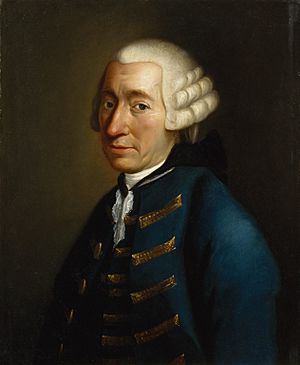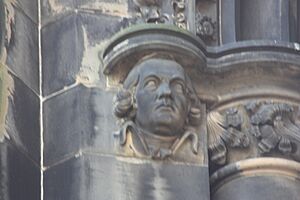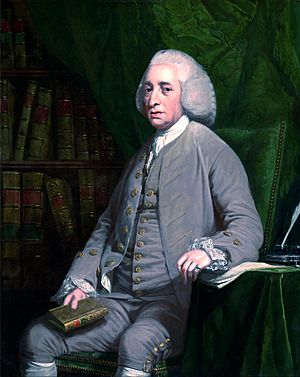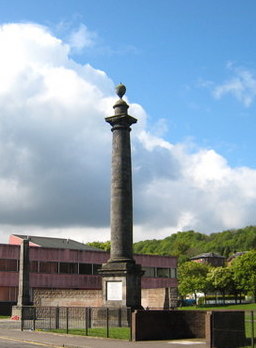Tobias Smollett facts for kids
Quick facts for kids
Tobias Smollett
|
|
|---|---|
 |
|
| Born | Tobias George Smollett 19 March 1721 Dalquhurn (now part of Renton, Scotland) |
| Died | 17 September 1771 (aged 50) Leghorn, Grand Duchy of Tuscany, now Italy |
| Occupation | Novelist, playwright and surgeon |
| Alma mater | University of Glasgow University of Edinburgh University of Aberdeen |
| Period | 1748–1771 |
| Genre | Picaresque, satire |

Tobias George Smollett (born March 19, 1721 – died September 17, 1771) was a Scottish writer, surgeon, and critic. He is famous for his adventure novels, especially The Adventures of Roderick Random (1748), The Adventures of Peregrine Pickle (1751), and The Expedition of Humphry Clinker (1771). These books were very popular and inspired later writers like Charles Dickens.
Contents
Early Life and Learning
Tobias Smollett was born in Dalquhurn, Scotland, which is now part of Renton. He was baptized on March 19, 1721. His father died when Tobias was only five years old. His mother, Barbara Smollett, raised him and his siblings.
Smollett went to Dumbarton Grammar School. Then, he studied medicine at the University of Glasgow. He became a surgeon. Some people think he also studied at the University of Edinburgh. Later, in 1750, he earned his Doctor of Medicine (MD) degree from the University of Aberdeen.
Adventures and Writing Career
In 1739, Smollett moved to London. He had written a play called The Regicide, about the murder of King James I of Scotland. When he couldn't get his play performed, he joined the navy as a naval surgeon.
He traveled to Jamaica and lived there for several years. In 1742, he worked as a surgeon during a difficult battle to capture Cartagena. His experiences in the navy later appeared in his novels.
Smollett married Anne "Nancy" Lascelles, a wealthy woman from Jamaica. They had a daughter named Elizabeth, who sadly died at age 15. Smollett spoke both English and Scots. He also translated important books from other European languages.
Famous Books and Stories
Smollett's first published work was a poem called "The Tears of Scotland" in 1746. It was about the Battle of Culloden. But his book The Adventures of Roderick Random made him famous. This book was a bit like his own life story.
In 1750, he visited France. This trip gave him ideas for his next successful novel, The Adventures of Peregrine Pickle. He also wrote The Adventures of Ferdinand Count Fathom in 1753.
Smollett became a well-known writer. He met other famous writers like David Garrick and Samuel Johnson. He even gave Samuel Johnson the nickname "that Great Cham of literature."

In 1755, Smollett translated Don Quixote by Miguel de Cervantes into English. He also worked as an editor for a large history book and a review magazine. Because of something he wrote in the magazine, he faced legal trouble and spent three months in prison. This experience also inspired one of his novels, The Life and Adventures of Sir Launcelot Greaves (1760).
Smollett then wrote a major work called A Complete History of England (1757–1765). This book helped him earn more money. He also had a play performed, a funny story called The Reprisal of the Tars of Old England.
In 1763, Smollett became very ill and lost his only child. He stopped his editing jobs and traveled to Europe with his wife. This journey led to his book Travels Through France and Italy (1766). He also wrote The History and Adventures of an Atom (1769), which shared his thoughts on British politics through a story set in ancient Japan.
A trip back to Scotland gave him ideas for his last novel, The Expedition of Humphry Clinker (1771). This book was published in the year he died. He had been sick for a while. He moved to Italy, where he passed away in September 1771. He was buried in the Old English Cemetery, Livorno.
Remembering Tobias Smollett
There is a monument built to remember Tobias Smollett in Renton, Scotland. It has a tall column with an urn on top. The monument was built in 1774 by his cousin, Jane Smollett. It is a very old and important building.

You can also find a plaque in Edinburgh where he stayed for a summer. It shows that he lived there with his sister.
Smollett is one of 16 Scottish writers honored on the Scott Monument in Edinburgh. There are also streets named after him in Nice, France, and in Livorno, Italy, where he is buried.
Radio Adaptations
His novel The Expedition of Humphry Clinker was turned into a three-part radio show in 2008. It was dramatized by Yvonne Antrobus.
See also
 In Spanish: Tobias Smollett para niños
In Spanish: Tobias Smollett para niños
- Physician writer
- Old English Cemetery, Livorno
 | Victor J. Glover |
 | Yvonne Cagle |
 | Jeanette Epps |
 | Bernard A. Harris Jr. |

